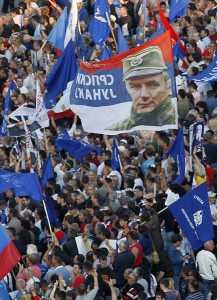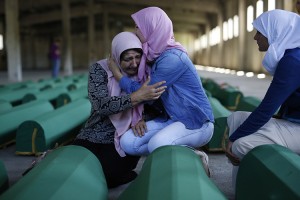A Life Sentence for Ratko Mladić
Thursday, December 7th, 2017December 7, 2017
On Nov. 22, 2017, the United Nations (UN) International Criminal Tribunal for the former Yugoslavia convicted former Bosnian Serb army leader Ratko Mladić of genocide and other crimes committed during the Bosnian War (1992-1995). The focal point of Mladić’s trial was the 1995 Srebrenica Massacre of thousands of Bosniaks (sometimes called Bosnian Muslims) by Bosnian Serb forces. Mladić was sentenced to life in prison.

Supporters of Ratko Mladić wave flags and a banner with his likeness during a rally in Belgrade, Serbia, where many consider him a hero. Mladić was sentenced to life in prison for genocide and other war crimes on Nov. 22, 2017. Credit: © Darko Vojinovic, AP Photo
The Bosnian War was a conflict between ethnic groups mainly in Bosnia-Herzegovina. Through most of the 1900’s, Bosnia-Herzegovina (often simply called Bosnia) had been part of Yugoslavia. Yugoslavia began to break into smaller countries in the early 1990’s, and Bosnia became independent in March 1992. Following independence, Bosnian, Croatian, and Serbian forces fought for control of the new country. The war, which often saw violence inflicted upon opposing civilian populations, ended in December 1995.
In July 1995, Serb troops captured the disputed city of Srebrenica. A group of about 15,000 Bosniaks attempted to flee the area, but the Serbs captured most of them. The Serbs claimed that the Bosniak civilians under their control would be transferred to safe areas. The Serbs sent the Bosniak women and children away on buses and trucks. But most of the Bosniak men were executed.

In 2015, Bosniak women weep over the remains of men killed in the 1995 Srebrenica Massacre during the Bosnian War (1992-1995). Many years after the massacre, bodies were exhumed from mass graves for identification. Credit: © Amel Emric, AP Photo
Investigators later found evidence that the Serbs killed over 7,000 Bosniaks at Srebrenica. The UN convicted several Bosnian Serb military leaders for their roles in the massacre. The UN also charged Mladić, then head of the Bosnian Serb army, and Radovan Karadžić, then leader of the Bosnian Serbs, with war crimes. Karadžić was captured in 2008. His trial began in 2009 at a UN criminal court in The Hague, the Netherlands. Mladić was arrested in 2011. His trial began in 2012. In 2016, Karadžić was found guilty of genocide and other war crimes and sentenced to 40 years in prison.
In 2017, a Serbian court dealt with the issue for the first time as eight former Bosnian Serb police officers accused of participating in the massacre went on trial in Belgrade. On November 22, the UN convicted Mladić on two charges of genocide, five charges of crimes against humanity, and four counts of war crimes. A week later, on November 29, Slobodan Praljak, a Bosnian Croat military commander during the Bosnian War, died after drinking poison in a UN courtroom upon the confirmation of his 20-year prison sentence for war crimes.


